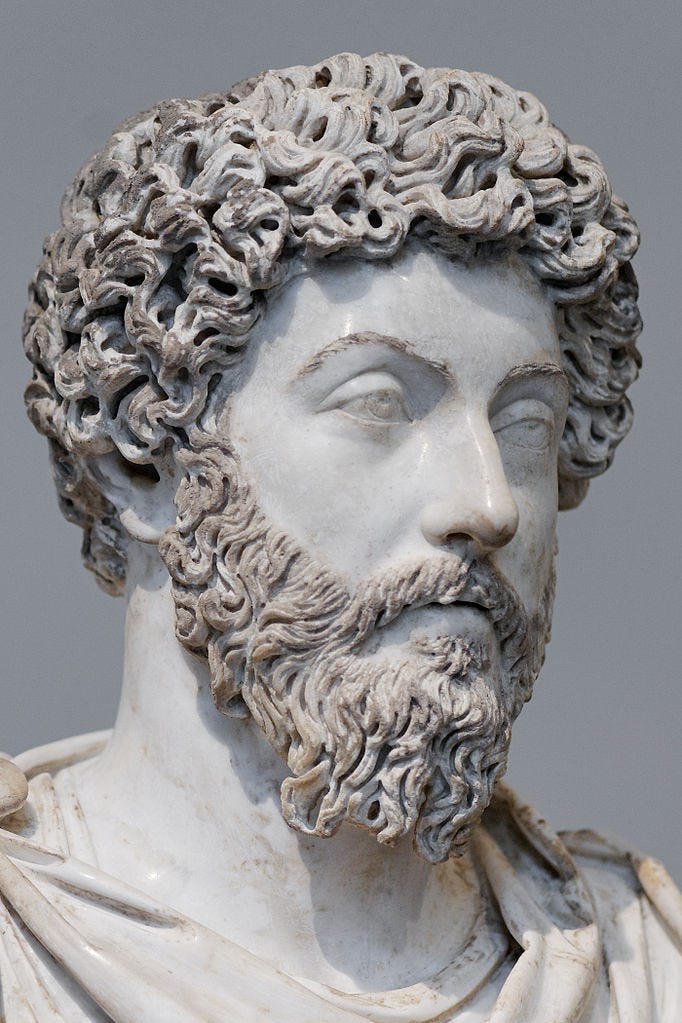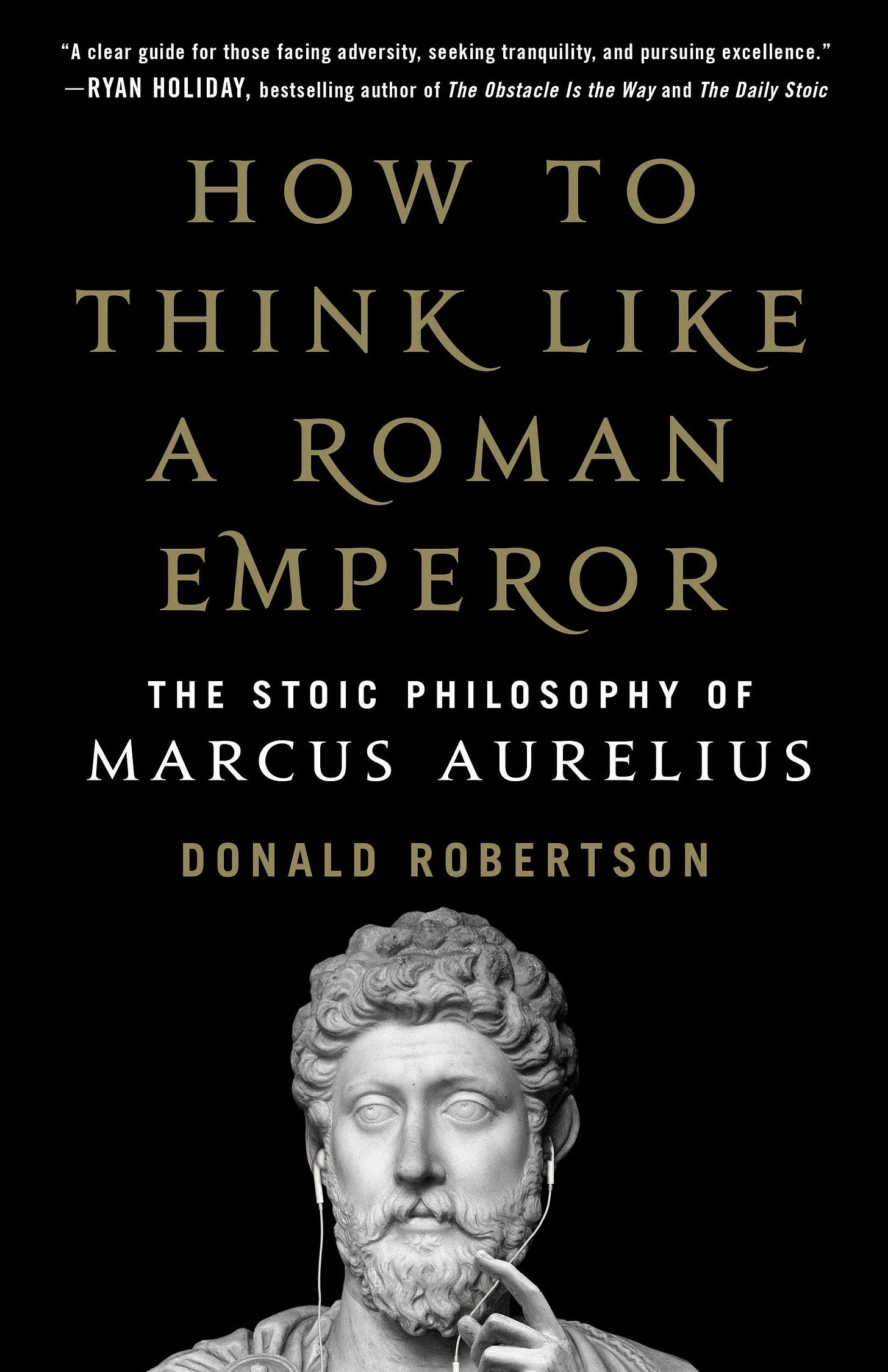“People who are excited by posthumous fame forget that the people who remember them will soon die too. And those after them in turn. Until their memory, passed from one to another like a candle flame, gutters and goes out. But suppose that those who remembered you were immortal and your memory undying. What good would it do you? And I don’t just mean when you’re dead, but in your own lifetime. What use is praise, except to make your lifestyle a little more comfortable?”
— Marcus Aurelius, Meditations 4:19
Marcus Aurelius would be shocked to learn that his set of haphazard personal notes have not only survived but have come to resemble a scripture for practitioners of stoicism living more than eighteen centuries after his death. Far from being forgotten, Marcus has achieved the sort of posthumous fame that he never anticipated, did not seek, and would not have cared about in the least.
To read Meditations in the early twenty-first century is to delve into a set of very personal observations that Marcus composed for his own purposes while dealing with the myriad challenges he faced as Emperor of Rome. As Gregory Hays points out in the introduction to his translation, the notes are “spiritual exercises composed to provide a momentary stay against the stress and confusion of everyday life: a self-help book in the most literal sense.”
Far from being stuffy and inaccessible, Meditations is approachable and contains wisdom that we can readily relate to today. The fact that human nature, at its core, has remained unchanged over the centuries despite enormous changes in the structure of society makes the problems Marcus dealt with ones that we can identify with today.
Depending on our background, we can take snippets from his text and relate it to subjects like business and investing. But stoicism is more than a set of isolated quotes and has little to do with the “stiff upper lip” stereotype commonly associated with it. Stoicism is a philosophy of ethics and a guide for how to live a virtuous life in accordance with our nature.
Given the approachable nature of Meditations itself, I was skeptical when I began reading How to Think Like a Roman Emperor. Too many people tend to gravitate away from primary texts and seek out interpretations when going to the original source provides more value. It would be hard to improve upon the clarity that Marcus himself provides. However, cognitive psychotherapist Donald Robertson has written a worthwhile book that illustrates how stoicism remains relevant to readers with modern-day problems.
Meditations itself is not thematically structured with Marcus’s wisdom on various topics scattered throughout his text. Robertson uses historical events to illustrate how Marcus would counsel us to deal with topics such as speaking wisely, following our values, conquering desire, tolerating pain, dealing with fear, and managing anger.
A common, but naive, criticism of Meditations is that one must take its content with a grain of salt given that the life of a Roman emperor must necessarily have been totally different than what ordinary people experience, then and now. While there is no doubt a kernel of truth in that sentiment, Marcus had to deal with many of the problems facing people today.
After a vigorous early adulthood, Marcus fell into a pattern of dealing with chronic illnesses, yet he still led his armies into battle when needed, and did not spare himself from physical hardships. For many years, he shared power with his brother who exemplified none of the virtues of stoicism and instead fell under the spell of all sorts of vices that have afflicted humans throughout history. Marcus also dealt with a rebellion and challenges to his power with equanimity, restoring his authority without seeking revenge, even though his own wife had a role in conspiring against him.
Physical frailty afflicted Marcus for most of his life and had a clear impact on his writing. Some of the most powerful passages in Meditations have to do with how one should approach physical pain and the ultimate demise that all of us are destined to experience.
“As he aged into his fortes and fifties … he became physically frail, and that seems to be how subsequent generations remembered him. Writing in the fourth century, for instance, the Emperor Julian imagines Marcus’s skin looked diaphanous and translucent. Marcus even referred to himself in a speech as a weak old man, unable to take food without pain or sleep without disturbance. The Meditations also mentions him obtaining remedies for coughing up blood and spells of giddiness. He particularly suffered from chronic chest and stomach pains. He could manage only small amounts of food, taken late at night. Scholars have offered different diagnoses, the most common being chronic stomach ulcers, although he probably suffered from multiple health problems.”
Marcus did turn to his court physician who prescribed a concoction that included a small quantity of opium, but when it made him drowsy he stopped using it, only resuming when the quantity of opium was further reduced. He chose to deal with pain by attempting to see pain for what it is, and localizing the pain in his own mind to the specific location of the body where it was happening, refusing to add to its severity by allowing it to dominate his mind.
Robertson notes that Marcus’s attitude toward pain amounted to cognitive distancing, or having the ability to withdraw or separate one’s mind from bodily sensations. Modern cognitive-behavioral therapy advocates acceptance of unpleasant feelings, noting that pain becomes more painful when one struggles against it but the burden is often lightened if the sensation is accepted for what it is and viewed at a distance.
Does it make sense to read a book like How to Think Like a Roman Emperor as an introduction to stoicism? I think that the answer to that question is no because Meditations itself is not only very clear but should be approached with fresh eyes by readers who are new to these concepts. If one reads a secondary source prior to reading Marcus himself, one’s interpretation and view of Meditations will necessarily be impacted. However, this is not a criticism of Robertson’s work itself, just the concept of reading the opinion of others before you are exposed to the original thinking for yourself. I would even advocate skipping the introduction to Meditations written by translator Gregory Hays until after reading Marcus’s text itself.
Everyone has a unique set of life experiences and comes to stoicism from a different place. Reading any good book can become like a conversation with the author, if the reader allows it. The twenty-first century reader of Meditations will bring to the conversation different specifics than a reader several centuries ago but will share the same underlying human condition.
Your initial conversation with Marcus will be most meaningful if it occurs unfiltered and uninfluenced by the experiences and thinking of others. Once you come to your own understanding of Meditations and make your own notations about how it applies to your life, it could make sense to seek out the opinions of others. In that context, a book like How to Think Like a Roman Emperor can be time well spent for those who are looking for concrete applications of stoicism to modern day life.
The Rational Walk received a review copy of How to Think Like a Roman Emperor.
Copyright, Disclosures, and Privacy Information
Nothing in this article constitutes investment advice and all content is subject to the copyright and disclaimer policy of The Rational Walk LLC.
Your privacy is taken very seriously. No email addresses or any other subscriber information is ever sold or provided to third parties. If you choose to unsubscribe at any time, you will no longer receive any further communications of any kind.
The Rational Walk is a participant in the Amazon Services LLC Associates Program, an affiliate advertising program designed to provide a means for sites to earn advertising fees by advertising and linking to Amazon.com.




I really struggled with Meditations before I got the Hayes translation. I don't feel that I lost anything by doing that but maybe I should go back to an older translation but it felt tedious to read.